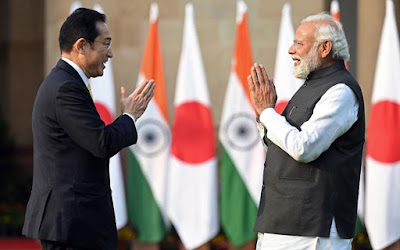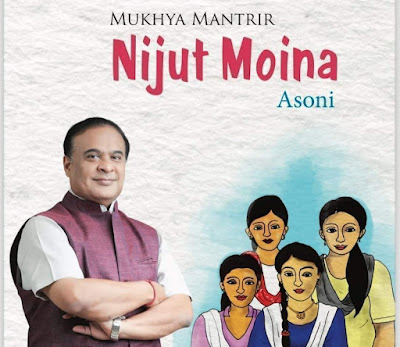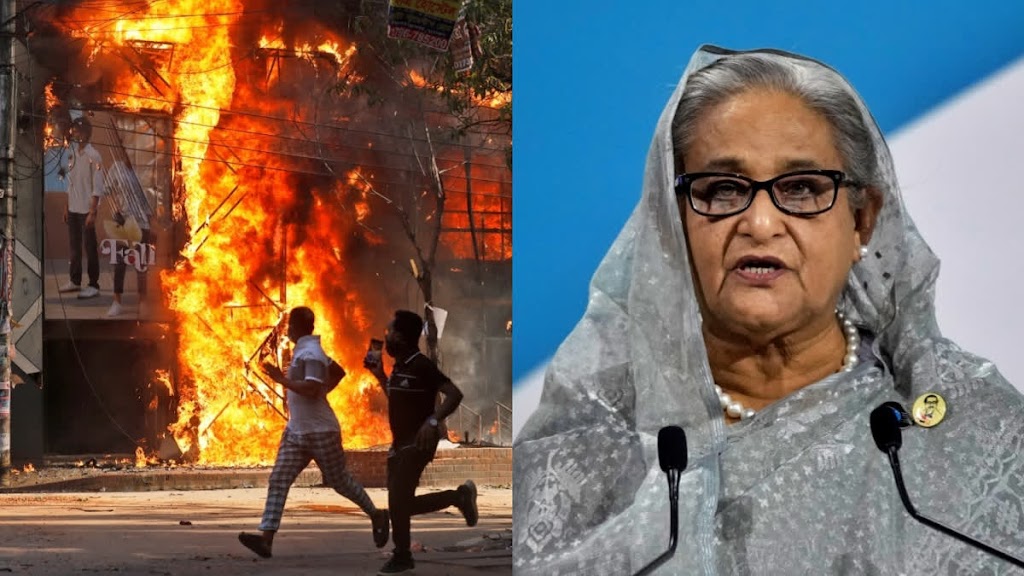Japan-India Relations | 14th India-Japan Annual Summit 2022, New Delhi
The friendship between India and Japan has a long history rooted in spiritual affinity and strong cultural and civilization ties dating back to the visit of Indian monk Bodhisena in 752 AD. India and Japan established diplomatic relations in 1952. In the first decade after diplomatic ties were established, several high-level exchanges took place, including the Japanese Prime Minister’s visit to India in 1957.
Japan was among the few countries that bailed India out of the balance of payment crisis in 1991. The Act East Forum, established in 2017, aims to provide a platform for India-Japan collaboration under the rubric of India’s “Act East Policy” and Japan’s “Free and Open Indo-Pacific Vision”.
Japan-India Summit Meeting
14th India – Japan Summit 2022
The 14th India-Japan Annual Summit was held in New Delhi on 19th March, 2022. Indian Prime Minister Narendra Modi and visiting Japanese Prime Minister Fumio Kishida participated in the summit along with a group of senior officials. This was the first physical summit since Prime Minister Narendra Modi’s important visit to Japan in 2018.
Speaking at the India-Japan Economic Forum, PM Modi said, ” Progress, prosperity and partnership are the basis of India-Japan relations. We are committed to providing all possible support to Japanese companies in India.”
Here are some key highlights of the discussions between the Prime Ministers of India & Japan during the India-Japan Summit 2022.
Why in the News?
Recently, the Prime Minister of Japan made an official visit to India for the 14th India-Japan Annual Summit.
Key Highlights of 14th India-Japan Annual Summit 2022
Reciprocal Provision of Supplies and Services between Japan Self-Defense Forces & Indian Armed Forces
• It was decided to continue the bilateral and multilateral exercises including “Dharma Guardian” and “Malabar” & the inaugural fighter exercise between the Japan Air Self-Defense Force and the Indian Air Force.
QUAD: Peace & Prosperity in Indo-Pacific
• The Prime Ministers affirmed the importance of bilateral partnerships, including the quadrilateral cooperation among Australia, India, Japan, and the United States (the Quad).
• They decided to advance Quad cooperation through the next Quad Leaders’ Summit in Japan in the coming months.
Indo-Pacific Oceans’ Initiative
• The Prime Ministers acknowledged the growing space for cooperation between the IPOI and Free and Open Indo-Pacific (FOIP).
• They reiterated their full support for the “ASEAN Outlook on the Indo-Pacific (AOIP)”.
United Nations Convention on the Law of the Sea
• India & Japan decided to continue prioritizing the United Nations Convention on the Law of the Sea (UNCLOS), & strengthen maritime security, to meet challenges against the rules-based maritime order in the East and South China Seas.
• They called for full implementation of the Declaration on the Conduct of Parties in the South China Sea and the early conclusion of a substantive and effective Code of Conduct in the South China Sea in accordance with international law, especially UNCLOS.
International Cooperation to combat Terrorism
• They urged countries to take resolute action against terrorist networks with international commitments including to FATF.
• They spoke about early adoption of the Comprehensive Convention on International Terrorism (CCIT) in the United Nations.
Commitment to Eliminate Nuclear Weapons
• The Prime Ministers reaffirmed their shared commitment to the total elimination of nuclear weapons.
• The Japanese Prime Minister stressed the importance of early entry into force of the Comprehensive Nuclear-Test-Ban Treaty (CTBT).
• They decided to continue working together for India’s membership of the Nuclear Suppliers Group.
Tackling Climate Change
• The Prime Ministers, building on the outcome of COP26, discussed various pathways for energy transitions reflecting different national circumstances and constant innovation to achieve global net-zero emission.
India-Japan Clean India Partnership
• They welcomed the launch of the India-Japan Clean Energy Partnership (CEP) for achieving sustainable economic growth, and ensuring energy security, in areas such as Electric Vehicles (EV), Storage Systems including Batteries, Electric Vehicle Charging Infrastructure(EVCI), Solar Energy, Clean including Green Hydrogen/Ammonia, Wind Energy, exchange of views on respective energy transition plans, Energy Efficiency, CCUS (Carbon dioxide Capturing, Utilization and Storage) and Carbon Recycling
• The countries discussed the signing of the MoC for cooperation in decentralized domestic wastewater management.
• It was conveyed that Japan would be joining the Indian-Swedish climate initiative LeadIT to promote heavy industry transition. They welcomed the signing of the MoC on Sustainable Urban Development.
Special Strategic and Global Partnership
• They also expressed their shared intention to realize JPY 5 trillion of public and private investment and financing from Japan to India in the next five years, to finance appropriate public and private projects of mutual interest.
India-Japan Industrial Competitiveness Partnership (IJICP)
• The Prime Ministers welcomed the formulation of a Roadmap under the IJICP, to further promote industrial cooperation between the two countries including in the areas of MSME, industries & supply chains.
• They welcomed the renewal of their bilateral currency swap agreement of USD 75 billion.
• They welcomed the amendment promoting trade of fish surimi between India and Japan under India-Japan Comprehensive Economic Partnership Agreement (CEPA).
• They welcomed India’s approval of imports of Japanese apples and relaxation of procedures of Indian mango exports to Japan.
India- Japan Digital Partnership
• The Japanese Prime Minister looked forward to attracting more highly skilled Indian IT professionals to contribute to the Japanese ICT sector.
• They also welcomed the progress on the “India-Japan fund-of-funds” to mobilize funds for emerging Indian start-ups.
• Welcoming the signing of MoCs in the fields of Cybersecurity and ICT, they decided to deepen cyber engagement with each other in multilateral fora, including in the United Nations.
• They shared the view to co-operate in various fields like 5G, Open RAN, Telecom Network Security, submarine cable systems, and Quantum Communications.
Now World_Polity is on every platform you can connect with us by just clicking the below social media links. Thank You.
• Subscribe our Youtube channel
• Join our Facebook Page
• Join our telegram Channel
* Recent Top Most Searches :
• India-China Border Tensions : The Worst Clash
• Agricultural Revolutions in India
Well if you like the article on 14th India – Japan Summit 2022 | Key Highlights of 14th India-Japan Annual Summit 2022 do comment & show your support by sharing it to the other aspirants and if there is any query you are welcome to ask.



